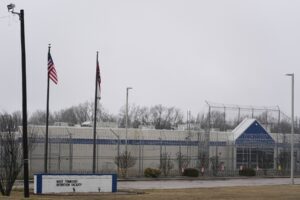Mason, Tennessee Faces Division Over Proposed ICE Detention Center
Mason, a quaint town nestled in West Tennessee, spans just two square miles and boasts a population of approximately 1,000 residents. Recently, however, the peaceful atmosphere of this small community has been overshadowed by a controversial decision regarding the reopening of an immigration detention facility.
Shannon Whitfield, a long-time resident of Mason for the past 13 years, expressed her discontent following the town leaders’ unanimous vote to revive the West Tennessee Detention Facility as a U.S. Immigration and Customs Enforcement (ICE) center. “This is not the place for an ICE facility. This is not the place for a for-profit prison,” she stated in an interview with CBS News. The town’s reputation has been marred by past financial difficulties, which included corruption scandals and mismanagement, leading to crippling debt and a dwindling business landscape.
The Reopening and Its Implications
For nearly four years, the West Tennessee Detention Facility has remained closed. With its reopening, the facility is poised to accommodate approximately 600 ICE detainees. The prison is owned by CoreCivic, a for-profit prison company that asserts the reopening will generate over 200 jobs and significantly enhance revenue for both Mason and Tennessee through tax contributions and impact fees. This perspective is echoed by Mason’s Mayor, Eddie Noeman, who supports the project.
On the other side of the debate, Alderwoman Virginia Rivers voted against the proposal, voicing her concerns. “I need to make it clear that while I am in favor of generating jobs in Mason, I am against the mistreatment of people involved. Not all money is good money,” she remarked, emphasizing the moral dilemma at play.
Political Shifts and Impacts
President Trump’s administration reversed a previous policy under President Biden, which halted the renewal of contracts with private prison operators. CoreCivic, having closed the West Tennessee Detention Facility due to Biden’s executive order, now seizes the opportunity to reopen it under the new administration.
In a response to the plans for reopening, CoreCivic highlighted its longstanding relationship with Mason and Tipton County, noting that its presence in the area dates back nearly 35 years. However, the company has faced scrutiny due to multiple state audits in Tennessee revealing staff shortages and high turnover rates. A recent analysis indicated that inmates in CoreCivic facilities are statistically twice as likely to face fatal incidents compared to those in government-run prisons, although CoreCivic has contested these findings.
Community Concerns
Alderwoman Rivers argued that the ICE facility detracts from the town’s development needs, saying, “We need other things in our community. We need homes. We need schools and daycare services.” She emphasized that while new businesses like Ford could bring employment opportunities in the future, such prospects remain uncertain for several years.
Local resident Shannon Whitfield articulated the emotional ramifications of the situation, stating, “I don’t want my neighbors to go to work out there. I don’t want them to make a choice between employment benefits and compromising their values.” The divided opinions in Mason reflect a broader national debate regarding immigration policy and the implications of privatization in the prison system.
| Key Aspects | Details |
|---|---|
| Facility Name | West Tennessee Detention Facility |
| Expected ICE Detainee Capacity | 600 Detainees |
| Estimated New Jobs Created | 200 Jobs |
| Main Opponent’s Concern | Mistreatment of Detainees |
As Mason grapples with these critical decisions regarding its future, the community remains at a crossroads, facing not just economic challenges but also ethical considerations surrounding the privatization of the prison system.




